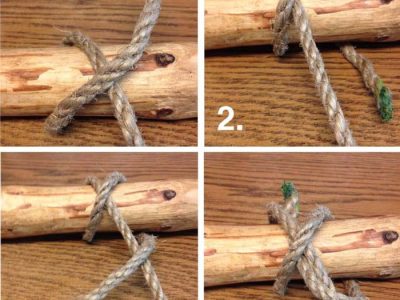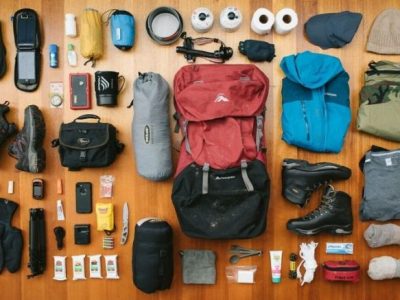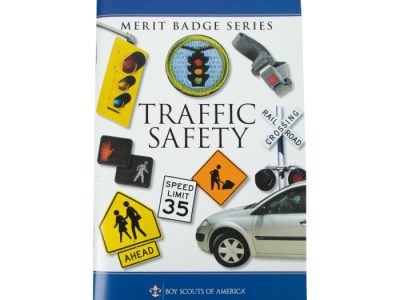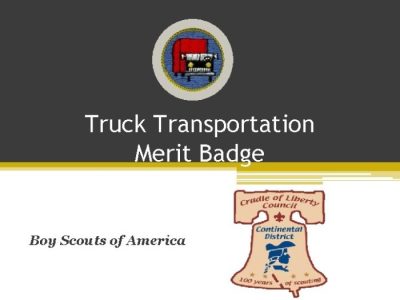Scout first aid kit essentials – Scouts often find themselves in remote areas, far from medical assistance. That’s why having a well-stocked first aid kit is essential for any scout. This comprehensive guide provides a detailed overview of the essential components of a Scout first aid kit, covering everything from wound care to injury management and more.
Essential Components
For scouts venturing into the wilderness, a well-stocked first aid kit is indispensable, providing essential tools to address minor injuries and emergencies. A comprehensive kit should include a range of items, organized into sections for quick and easy access.
Essential Items
- Antiseptics and Cleaning Supplies:Antiseptic wipes, gauze pads, and bandages for cleaning and disinfecting wounds.
- Wound Care:Adhesive bandages in various sizes, gauze rolls, and wound closure strips for dressing wounds.
- Pain Relief:Ibuprofen or acetaminophen for pain management.
- First Aid Ointments:Antibiotic cream, hydrocortisone cream for rashes, and petroleum jelly for minor burns.
- Splinting and Immobilization:Elastic bandages, triangular bandages, and splints for supporting injured limbs.
- Other Essentials:Tweezers, scissors, antiseptic wipes, and a whistle for signaling for help.
Wound Care
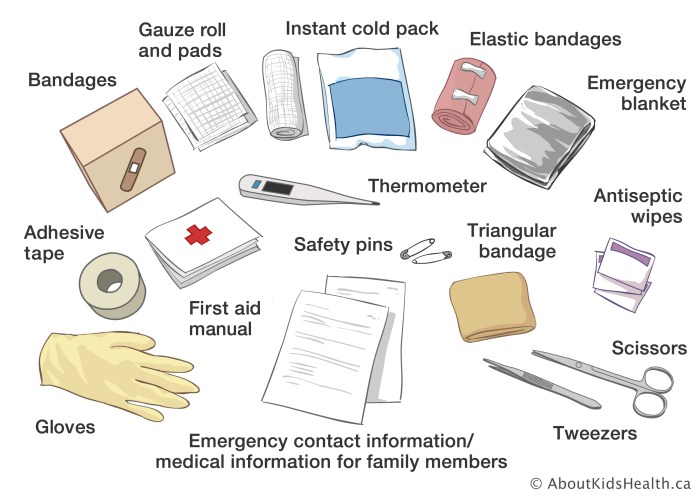
Wounds are a common occurrence in scouting, ranging from minor cuts and scrapes to more serious lacerations and punctures. Proper wound care is essential to prevent infection and promote healing.
The first step in wound care is to clean the wound. This can be done with soap and water or an antiseptic solution. Once the wound is clean, it should be dressed with a bandage or gauze to protect it from further contamination.
Bandages
Bandages are used to cover and protect wounds. They can be made of various materials, such as gauze, cloth, or plastic. Bandages should be applied snugly but not too tightly, as this can restrict blood flow and impede healing.
Gauze
Gauze is a sterile material used to absorb blood and other fluids from wounds. It can be applied directly to the wound or used as a dressing under a bandage.
Antiseptic Wipes
Antiseptic wipes are pre-moistened wipes that contain an antiseptic solution. They are used to clean wounds and prevent infection.
Injury Management
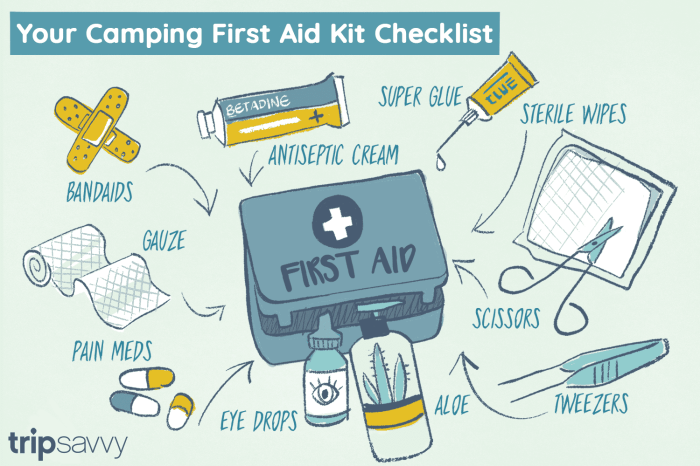
Scouts engage in various activities that pose risks of injuries. Common injuries include sprains, strains, and fractures. Recognizing and managing these injuries promptly is crucial for the well-being of the scouts.
Assessing an injury involves determining its severity and type. Sprains occur when ligaments are stretched or torn, while strains involve muscle or tendon injuries. Fractures are breaks in bones. Immobilizing the injured area is essential to prevent further damage. This can be achieved using splints, slings, or bandages.
Seeking Medical Attention, Scout first aid kit essentials
Seeking medical attention is crucial when injuries are severe or do not respond to first aid treatment. Signs of serious injuries include:
- Deformity or instability in the injured area
- Severe pain or swelling
- Numbness or tingling
- Inability to move the injured area
- Open wounds or bleeding
In such cases, it is important to seek professional medical assistance promptly to ensure proper diagnosis and treatment.
Medication and Pain Relief

Carrying appropriate medications in a first aid kit is crucial for treating minor illnesses and injuries. Pain relievers, antihistamines, and anti-nausea medication are essential components of any well-stocked kit.
Pain Relievers
Over-the-counter pain relievers, such as ibuprofen or acetaminophen, can provide relief from headaches, muscle aches, and other minor pain. Always follow the recommended dosage on the packaging and consult a medical professional if pain persists or worsens.
Antihistamines
Antihistamines are effective in treating allergic reactions, such as those caused by insect bites or stings. They can help reduce itching, swelling, and other symptoms. Again, follow the recommended dosage and consult a healthcare provider if symptoms do not improve.
Anti-nausea Medication
Anti-nausea medication, such as dimenhydrinate or meclizine, can help alleviate nausea and vomiting. These medications are particularly useful for motion sickness or other conditions that cause stomach upset. Proper dosage and administration should be strictly adhered to.
Consultation is Key
It is essential to consult a medical professional before administering any medication, especially for children or individuals with underlying health conditions. They can provide proper guidance on dosage, administration, and potential side effects.
Hygiene and Sanitation
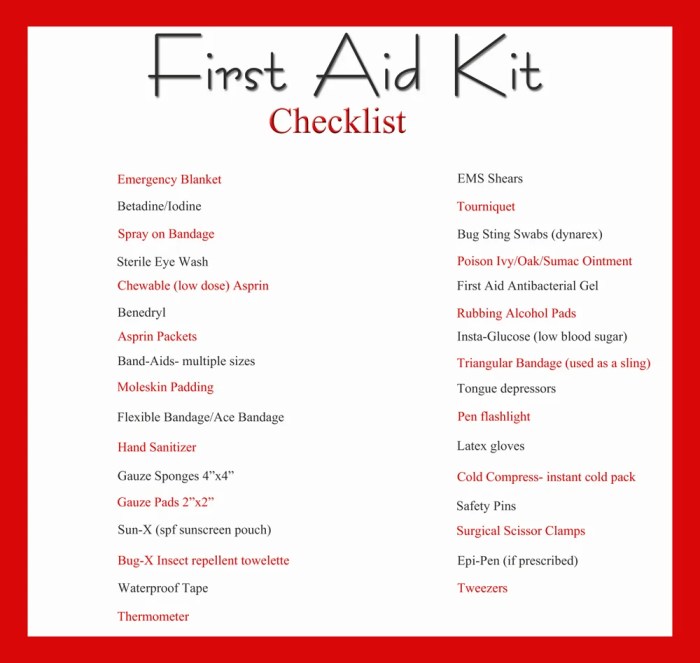
Maintaining hygiene in the wilderness is crucial to prevent infections and ensure overall well-being. It involves keeping your hands clean, washing wounds promptly, and using antiseptic wipes, soap, and water for sanitation purposes.
Handwashing
Washing hands with soap and water is the most effective way to remove dirt, bacteria, and viruses. If soap and water are not available, use hand sanitizer with at least 60% alcohol content.
Environmental Considerations: Scout First Aid Kit Essentials
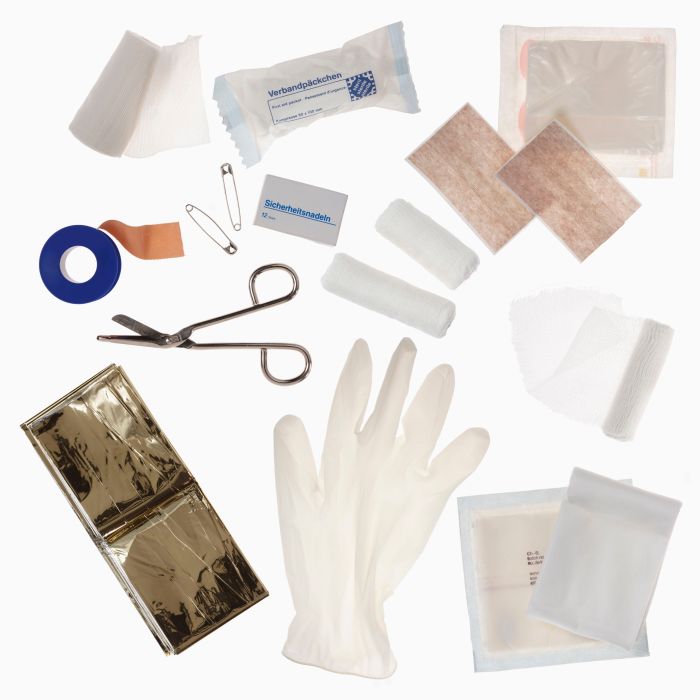
Weather conditions can significantly impact first aid treatment. Extreme heat or cold can lead to heat exhaustion, hypothermia, or frostbite. Proper clothing, hydration, and shelter are crucial to prevent these conditions.
Sun Protection
Prolonged sun exposure can cause sunburn, skin damage, and even skin cancer. Sunscreen with an SPF of 30 or higher is essential for protecting the skin from the sun’s harmful UV rays.
Insect Repellent
Insect bites and stings can cause discomfort, allergic reactions, or disease transmission. Insect repellent containing DEET, picaridin, or IR3535 can effectively deter insects.
Protective Clothing
Wearing appropriate clothing can protect against various environmental hazards. Long sleeves and pants can shield from sun exposure, insect bites, and scratches. Sturdy footwear provides support and protection from uneven terrain or sharp objects.
Minor Ailments
Exposure to the elements can cause minor ailments such as sunburn, heat rash, or chapped lips. First aid treatment involves cooling the affected area, applying soothing lotions, and protecting it from further exposure.
Training and Education
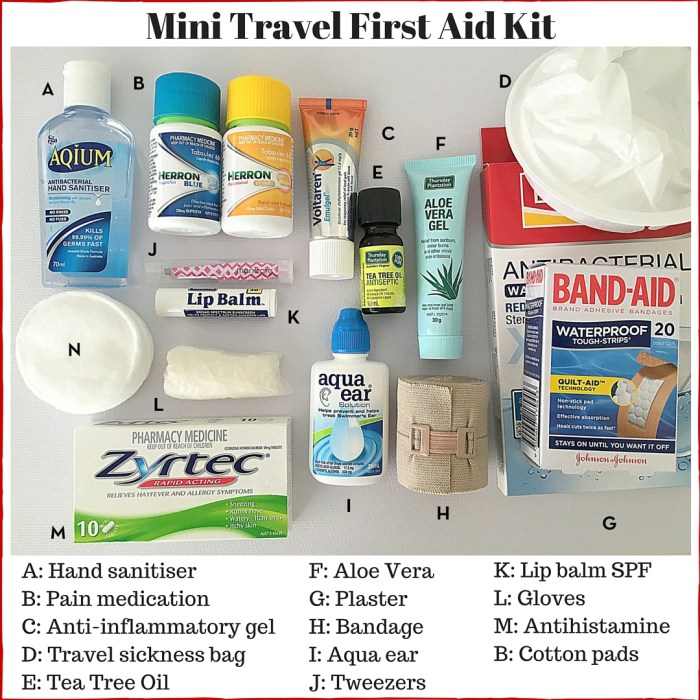
Proper training is essential for scout leaders and participants to ensure they are equipped with the necessary knowledge and skills to provide effective first aid in emergency situations.
First aid and CPR certification courses provide comprehensive training on assessing injuries, performing basic life-saving techniques, and administering first aid treatment. Certified individuals are more confident and competent in handling emergencies, which can significantly improve the chances of successful outcomes.
Resources for Training
- American Red Cross:Offers a range of first aid and CPR courses, including online and in-person options.
- National Safety Council:Provides first aid and CPR training programs for various levels, from basic to advanced.
- Boy Scouts of America:Offers first aid and CPR training as part of its youth programs and adult leadership development courses.
Closing Notes
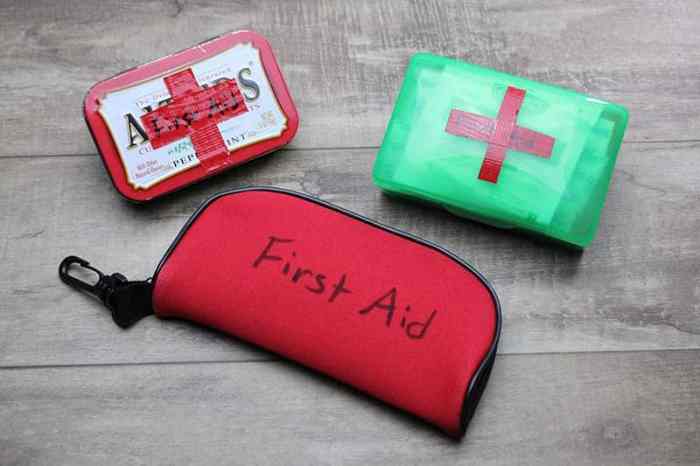
By following these guidelines and equipping themselves with the necessary supplies, scouts can ensure they are prepared to handle any medical emergencies that may arise during their outdoor adventures.
Quick FAQs
What are the most important items to include in a Scout first aid kit?
Essential items include bandages, gauze, antiseptic wipes, pain relievers, antihistamines, and anti-nausea medication.
How should I organize my first aid kit?
Organize the kit into sections for easy access, such as wound care, injury management, and medication.
What are some common injuries that scouts may experience?
Common injuries include sprains, strains, fractures, and minor cuts and scrapes.

